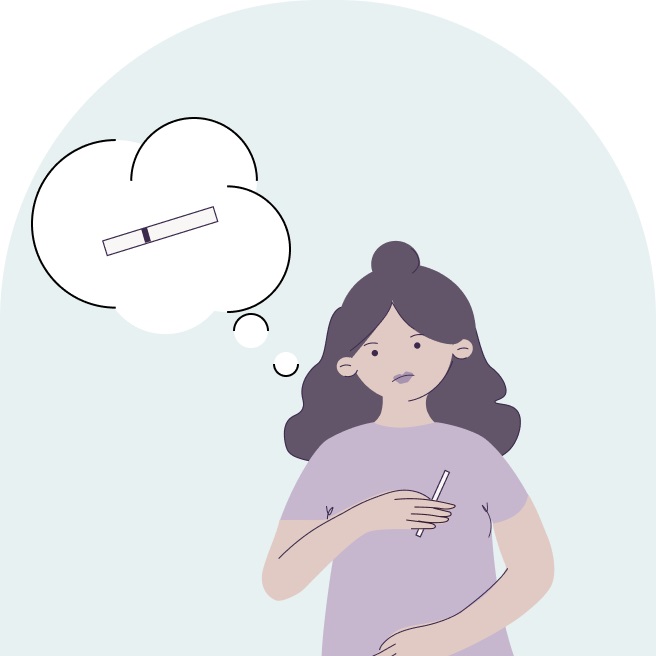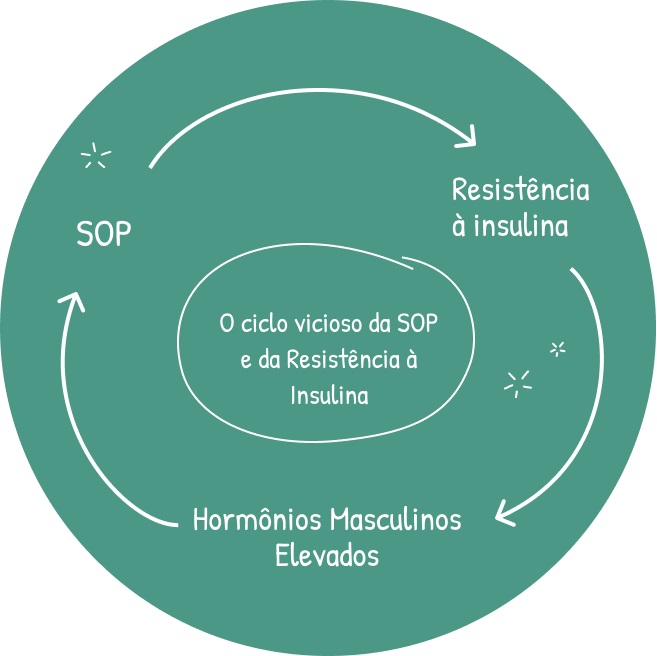Did you know that many times your body is trying to tell you that something isn’t right, but we don’t even realize there’s a problem? And that these signs that seem so small could even help explain why you can’t get pregnant? Yes, often those annoying symptoms we think are nothing might actually mean a lot! Here are some examples of signs that something isn’t right:
- Irregular cycles
- Absence of menstruation
- Hair in unusual places, or excessive hair
- Overweight
- Hair loss
- Cystic acne, the kind that forms red and painful lumps
- Small cysts on the ovaries
- Pain during intercourse
Some women end up ignoring these symptoms, even though they cause daily discomfort. In fact, many have no idea that these symptoms may be related to difficulty getting pregnant! In this case, all the signs above have something in common: they are symptoms of what is called Polycystic Ovary Syndrome (PCOS).This is a very common condition, but many women wait a long time before seeing a gynecologist to find out what these signs mean. It’s even common to only discover PCOS after seeking help for trouble getting pregnant. If you have any of these symptoms and have wondered what could be causing them, come with us as we explain exactly what PCOS is!
What is Polycystic Ovary Syndrome?
To understand what PCOS is, let’s first understand what a syndrome is: it’s a set of signs and symptoms with a cause that’s not well defined. Polycystic Ovary Syndrome (PCOS) is a hormonal disorder, and its main characteristic is an excess of male hormones in the body.
Did you know?: PCOS got its name because one of its most common symptoms is the presence of small cysts on the ovaries. These cysts are follicles that didn’t get enough hormones to reach ovulation, and without ovulation, it’s not possible to get pregnant. It’s these small cysts that can actually release even more male hormones in the body!
Some symptoms are quite familiar among women, such as very long or irregular menstrual cycles and difficulty getting pregnant. But there isn’t a set of symptoms that appears in all women with PCOS. Despite changes in the menstrual cycle, PCOS isn’t considered a menstrual disorder, but instead an endocrine-metabolic disorder.
Endocrine-metabolic disorder: a disorder that affects hormones and other chemical processes in the body
PCOS is a hormonal disorder that mainly affects three areas: androgen hormones, progesterone, and insulin. The first two are sex hormones, important for our reproductive system to work properly. Insulin helps the body absorb the glucose that feeds our cells.It may seem like these hormones have nothing to do with one another, but they are intimately connected! When one of them is unbalanced, it also affects the others. That’s how PCOS causes symptoms that seem so different from each other, from obesity and hair loss to irregular cycles and infertility.
How is PCOS treated?
If you’re having trouble getting pregnant and have some of these other symptoms, you might be asking yourself: so what should I do? First, talk to your gynecologist so they can order tests to confirm PCOS. These are usually simple tests, like blood tests and ultrasound.There is no definitive cure for PCOS, but doctors understand the relationship between insulin, sex hormones, and the disease. In many cases, the best treatment is to manage how the body produces insulin. That’s why the two most common ways doctors treat PCOS are myo-inositol and metformin.
Myo-inositol
Myo-inositol is a B-complex vitamin that works as a secondary hormone messenger. This means that this vitamin can boost the effects of other hormones. Myo-inositol is very effective at helping bodies that are insulin-resistant, which in turn helps regulate other hormones affected by PCOS. In short, myo-inositol may help break the cycle of hormonal imbalance so typical in PCOS. For many women, this is enough to start ovulating again.A big advantage of myo-inositol is that it’s not a medication, but a vitamin. For this reason, it is a more natural alternative, and doesn’t have the side effects that many medications cause. Because it’s a vitamin, it also doesn’t cause weight gain or loss, making it an option for women of various ages and conditions. You can find myo-inositol under the name FamiSitol, which you can buy here in our online store.
Metformin
Another very common approach for treating PCOS is a drug called metformin. This medication is used frequently to treat diabetes, and exactly for this reason, it can be effective in managing PCOS. Metformin also works by controlling glucose levels in the blood, as it increases the sensitivity of cells to insulin. Just like with myo-inositol,
It’s common to think that hormonal birth control treats PCOS, but this isn’t true. What happens is that the always-stable hormone levels in these birth control pills can help relieve the symptoms. However, that doesn’t mean they’re a cure for the syndrome. Plus, for those who want to get pregnant, taking birth control isn’t an option.
The causes of PCOS may not be well understood, but doctors know safe and effective ways to identify the syndrome and alleviate its symptoms. If you recognized any of our described signs in yourself, talk to your gynecologist!
Frequently Asked Questions about PCOS
Can PCOS cause other health risks?
The combination of symptoms of PCOS can increase the risk of other health problems, such as obesity, heart problems, depression, diabetes, endometrial hyperplasia, and metabolic syndrome.
Are there other ways to ease PCOS symptoms?
Lifestyle changes may help balance the hormones affected by PCOS. A balanced diet with low-glycemic foods together with moderate exercise can make a big difference. For overweight women, losing about 10% of your body weight can be enough to start ovulating again.
Does PCOS always affect fertility?
This condition affects each body very differently. Some women with PCOS conceive without major problems, but it’s common for the condition to impact fertility. This happens because PCOS often prevents ovulation, and without ovulation it’s impossible to get pregnant.
I don’t have cysts on my ovaries—can I still have PCOS?
Although it’s a very common symptom, you don’t need to have ovarian cysts to be diagnosed with PCOS. Typically, PCOS is considered when a woman has at least two of the following characteristics: irregular cycles, excess male hormones, and multiple small cysts in the ovaries.












